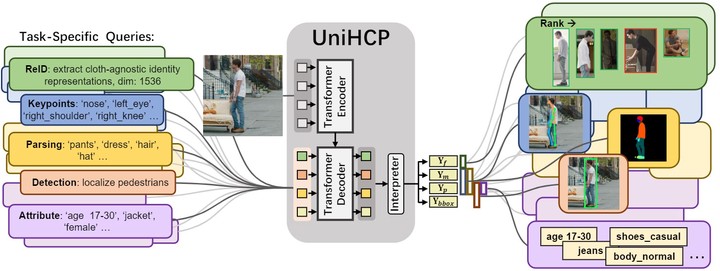 UniHCP handles a massive collection of human-centric tasks uniformly by task-specific queries and a task-guided interpreter, all results are yielded in parallel through a simple encoder-decoder transformer architecture.
UniHCP handles a massive collection of human-centric tasks uniformly by task-specific queries and a task-guided interpreter, all results are yielded in parallel through a simple encoder-decoder transformer architecture.Abstract
Human-centric perceptions (e.g., pose estimation, human parsing, pedestrian detection, person re-identification, etc.) play a key role in industrial applications of visual models. While specific human-centric tasks have their own relevant semantic aspect to focus on, they also share the same underlying semantic structure of the human body. However, few works have attempted to exploit such homogeneity and design a general-propose model for human-centric tasks. In this work, we revisit a broad range of human-centric tasks and unify them in a minimalist manner. We propose UniHCP, a Unified Model for Human-Centric Perceptions, which unifies a wide range of human-centric tasks in a simplified end-to-end manner with the plain vision transformer architecture. With large-scale joint training on 33 human-centric datasets, UniHCP can outperform strong baselines on several in-domain and downstream tasks by direct evaluation. When adapted to a specific task, UniHCP achieves new SOTAs on a wide range of human-centric tasks, e.g., 69.8 mIoU on CIHP for human parsing, 86.18 ma on PA-100K for attribute prediction, 90.3 mAP on Market1501 for ReID, and 85.8 JI on CrowdHuman for pedestrian detection, performing better than specialized models tailored for each task. VALSE 2023 spotlight